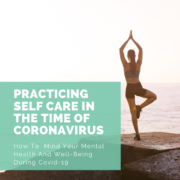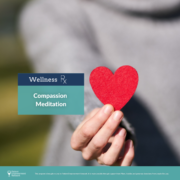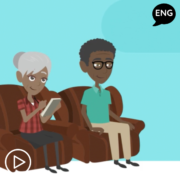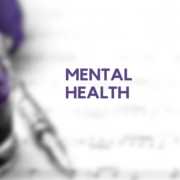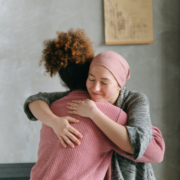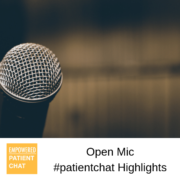Practicing Self-Care in the Time of Coronavirus – How to Mind Your Mental Health and Well-Being During Covid-19
As the coronavirus outbreak continues its relentless spread, the impact of the pandemic is being felt across the globe. We are facing a critical time of fear and uncertainty individually and in our communities.
COVID-19 will affect us all to varying degrees – physically, emotionally, socially and psychologically.
You may notice an increase in some of the following feelings:
- feeling stressed and anxious
- fearing that normal aches and pains might be the virus
- excessively checking for symptoms, in yourself, or others
- becoming irritable more easily
- feeling insecure or unsettled
- having trouble sleeping
- feeling helpless or a lack of control
- having irrational thoughts
Both The Centers For Disease Control and Prevention (CDC)[1] and The World Health Organisation (WHO)[2] have responded to the psycho-social impact of coronavirus by releasing guidelines for those whose mental health is being negatively impacted.
In addition to these guidelines, many patient leaders are providing information and support to their communities through their social media channels. To quote board certified coach, Nancy Seibel (@NancyLSeibel) “those of us who have had cancer and other serious health challenges know something about how to self-calm and cope with uncertainty. We know a lot about life being upended; uncertainty; living with but not in fear. It’s a hard-won gift, one that we can share with others.”
While this is naturally a worrying time, there are many things we can do to mind our mental health and boost our immunity and well-being at this time. Being proactive about how you handle this crisis can help to keep both your mind and body stronger. I hope you will find the following tips helpful and reassuring as you navigate your way through this time of global crisis.
10 Ways To Take Care Of Your Mental Health And Wellbeing During Covid-19
1. Recognize What You Can Control
While many of the things that surround this crisis are outside of your control, you can still focus on those things that are within your control. Hand washing, staying at home, limiting unnecessary travel and contact with others are steps we can all take to decrease our personal risk and protect others. If you’re a cancer patient, currently undergoing treatment, you are in a high-risk group because cancer treatment compromises your immune system[3]. Follow the advice for High Risk Patients outlined on the Centers for Disease Control and Prevention (CDC) website.[4]
That said, the reality of life as a cancer patient has probably prepared you for this moment better than most. As breast cancer survivor, Diane Mapes, wrote in a recent Fred Hutch [5] article, “For the immunocompromised and those with disease, social distancing and uncertainty are a way of life.”
2. Focus On The Facts
In a world of 24/7 rolling news and social media updates, it’s easy to get drawn into speculation and hype. “It’s ok to be scared,” says breast cancer survivor, Karen Murray (@MurrayKaren), “but don’t let fear take hold.” Rumors, myths and falsehoods can take on a life of their own if we let them, but as patient advocate, Nancy Stordahl[6] reminds us, “calmness is contagious too.”
Keeping a realistic perspective of the situation based on facts is important at this time. Avoid media outlets that build hype or dwell on things that can’t be controlled. Stick to respected sources of information on the coronavirus and how to handle it.
If you’re unsure about something you’ve read or heard, check it on the International Fact-Checking Network (IFCN) at the Poynter Institute[7]. If you’re concerned about whether you may have COVID-19, the Cleveland Clinic[8] has a free screening tool to find out your risk level, based on your symptoms and travel. Additionally, Intermountain’s COVID-19 Symptom Checker[9] is an easy to use, digital tool to help people get important information about COVID-19, assess their risk, and navigate to the most appropriate care setting. “These are scary times, for sure,” points out Nancy, “but knowledge is power. Learn what you need to in order to keep you and your loved ones safe.”
3. Limit Your Exposure To The News
The constant stream of social media updates and news reports about coronavirus could cause you to feel extremely stressed. If the constant drip feed of live news and social media is making you anxious, limit your exposure to news outlets. I’m not suggesting you totally ignore important news updates – it’s essential to keep yourself informed. But you can reduce your anxiety by reducing the amount of time you expose yourself to the news. Limit your media consumption to a certain amount of time each day. According to WHO, minimizing the amount of news you watch can be beneficial in helping people keep calm and positive. The organization also suggests we “find opportunities to amplify positive and hopeful stories and positive images of local people who have experienced Covid-19.”
4. Practice Good Self-Care
It’s important to pay attention to your self-care needs, especially during times of stress. Eating a healthy, balanced diet, avoiding excessive alcohol and stimulants, getting plenty of sleep, practising relaxation techniques, such as breathing exercises and meditation, and taking daily exercise are key ways to stay physically and psychologically healthy during stressful times. Oncoplastic breast cancer and reconstructive surgeon, Dr Tasha Gandamihardja (@DrTashaG) also suggests you “do little things that give you joy e.g. watch a favorite program or read a favorite book.”
Don’t put too much pressure on yourself at this time, advises metastatic breast cancer patient, Julia Barnickle (@JuliaBarnickle). “On days when I don’t have the energy to do much, I tell myself ‘just do one thing.’ If I feel like doing more, that’s great, but I never feel guilty about only being able to do one thing. So I choose the one thing that feels most important, whatever it is,” she says.
5. Keep Active
Build regular exercise into your day. There’s an abundance of scientific evidence showing how important fitness is for mental health: so during this very stressful time, it’s even more important. The closure of gyms at this time doesn’t of course mean you can’t keep fit. Going for a walk or hike (if you aren’t self-quarantined) watching a workout video online, practicing yoga or walking up and down stairs in your home are all ways to keep active and fit. Cancer researcher, Emily Drake (@EK_Drake), has seized on this time as an opportunity to learn to run. “I’ve never been a runner,” she explains, “ but with gyms and yoga studios closed – online just doesn’t work for me – I need to get out.”
6. Eat To Beat Stress
Registered dietitian, Cathy Leman[10] recommends you mix and match from these 29 foods each day to boost your body’s stress busting powers.
- Vitamin C fruits and veggies
- Green and red peppers, potatoes, oranges, grapefruit, strawberries, tomatoes, kiwi, cauliflower, cabbage, onions
- Vitamin E foods
- Dry roasted sunflower seeds, almonds, spinach, safflower oil, wheat germ, green leafy vegetables
- Polyphenolic foods
- Chocolate, tea, coffee
- Complex carbohydrate foods
- Barley, rye, oats, whole wheat
- Omega 3 foods
- Walnuts, ground flax seeds, fatty fish, chia seeds, canola oil
7. Stick To A Daily Routine
Your daily routine may be affected by the coronavirus outbreak in different ways. But according to WHO, people should try to stick to their daily routines as much as possible. “Ensure that you create a realistic and helpful daily routine and structure to your day, and stick to it, “ recommends psychotherapist, Karin Sieger.[11] “Have regular times for getting up and going to bed as well as meal times.”
For those of us who are working from home maintaining a routine can be challenging. The temptation to sit in pajamas all day is real. Try to stick to a working routine as much as possible – this includes structuring your day with regular breaks (try working in 45-60 minute chunks of focused work followed by a short break), minimizing distractions, stopping for lunch, getting some fresh air, avoiding staying in the same position for prolonged periods of time and keeping hydrated.
8. Stay Connected
While “social distancing,” is hypothesized to flatten the curve of the contagion,[12] it’s not without costs. Research shows that social support is vital for our mental and physical health. According to WHO, individuals in isolation are one group that may feel the impact on their mental health the most. To combat the loneliness of self-isolation, the organization advises people to “stay connected and maintain your social networks”.
Maintaining strong connections will help you to feel supported, but since face-to-face in-person support is limited we need to find other ways to connect and receive support. Patient advocate, Terri Coutee (@6state) recommends utilizing online platforms. “Call/text family members often and talk about fun times together,” she suggests. Social media and social messaging apps are a boon at this time. Patient advocate, Siobhan Feeney (@BreastDense) says she is “so grateful for my social media friends in many countries as we share the burden of this pandemic.” In addition, individuals who are self-isolating can also use QuarantineChat,[13] a new app that aims to connect people who are quarantined and may not have close family or friends to call. [14]
9. Find Creative Distractions
Doing something creative can help improve your mood when you feel anxious or low. Creative activities can also increase your confidence and make you feel happier. This is because creative hobbies often completely absorb your attention, helping you to temporarily forget negative thoughts. Carolyn Thomas (@heartsisters) shares this lovely idea for creating together with friends: “my paper-crafting friends and I are having our first ever virtual card-making workshop together via the miracle of video chat…. We each have a number of springtime birthdays coming up among our families and friends, so we’ll be creating springtime-theme birthday cards today.”
Looking for some more creative ideas? From baking to blogging, journaling to jigsaws, Sara Liyanage, author of Ticking Off Breast Cancer, has compiled a bumper list of distractions[15] for you to try. Also check out PEN’s own Activity Guide here. Experiment until you find something that suits you.
10. Practice Kindness and Self-Compassion
Nancy Seibel recommends shifting your focus to giving and receiving kindness. “You’ll be worried, anxious or fearful at times. That’s a natural response to what’s happening, “ she says. “Accept those feelings compassionately. See if there’s anything to learn from them. Then shift your attention. Focus on what you’re grateful for. Walk. Ride your bike. Write. Dance.” She recommends starting with your own self-care, before expanding it out to others. “Calm and center yourself with meditation, deep breathing, knitting – whatever soothes you. Then support others. Spread a contagion of joy, love and kindness! That’s what will get us through this turbulent time.”
This Too Shall Pass
One of the things that is helping me right now is to tell myself that this reality is not forever. Patient advocate, Liza Bernstein[16] reminds us that while “for now, #COVID19 feels like the entire world’s permanent reality… [but] within that, there are moments, nuances, and joy. There is hope, a delicious piece of chocolate, or a beautiful flower, or a hilarious meme, of if you’re lucky, a dog to play with, a loved one to hug (if you’re in the same home and healthy!)… or whatever floats your boat.”
The spread of coronavirus is a new and challenging event. Most people’s lives will change in some way over a period of days, weeks or months. But in time, it will pass. My wish for you today, especially if you are feeling anxious, alone, or fearful, is that you can find something to hold onto in this moment. To quote psychologist and breast cancer and SCAD survivor, Elizabeth McKenzie[17], “In this moment, as I write this, I have all that I need. I have my breath. I have my mind. I have my family. I have friends. I have shelter. I have clean water and good food. I have the nearby woods in which to walk. Not all moments are like this but right now it is.”
Additional Resources
At Home Self-Care Tips for Parents During a Pandemic
References
[1] CDC. Coronavirus Disease 2019
[2] WHO. Mental Health and Psychosocial Considerations During
COVID-19 Outbreak In January 2020, The WHO declared the outbreak of a new coronavirus disease to be a Public Health Emergency of International Concern.
[3] Fred Hutch. Coronavirus: what cancer patients need to know
[4] Centers for Disease Control and Prevention. Are You at Higher Risk for Severe Illness?
[5] Fred Hutch. Lessons from cancer patients in the time of coronavirus
[6] Nancy’s Point. What Can Cancer Patients (or anyone) Do to Protect Themselves & Others During the COVID-19 Pandemic?
[7] The #CoronaVirusFacts / #DatosCoronaVirus Alliance unites more than 100 fact-checkers around the world in publishing, sharing and translating facts surrounding the novel coronavirus https://www.poynter.org/coronavirusfactsalliance.
[8] Cleveland Clinic. Find Out Your COVID-19 Risk
[9] Intermountain Healthcare. COVID-19 Symptom Checker.
[10]Dam.Mad. About Breast Cancer. Eat These 29 Foods to Help You Manage Stress
[11] Karin Sieger. Coping With Difficult Times.
[12] Live Science. Coronavirus: What is ‘flattening the curve,’ and will it work?
[13] https://quarantinechat.com
[14] Quarantine is the separation and restriction of movement of people who have potentially been exposed to a contagious disease to ascertain if they become unwell, so reducing the risk of them infecting others. This differs from isolation, which is the separation of people who have been diagnosed with a contagious disease from people who are not sick; however, the two terms are often used interchangeably, especially in communication with the public. The psychological impact of quarantine and how to reduce it: rapid review of the evidence
[15] Ticking Off Breast Cancer. Ways To Distract Yourself During Self-Isolation.
[16] It’s The Bunk. It’s #Covid19 – Start Where You Are
[17] My Eyes Are Up Here. All I Need

A Stanford Medicine X e-Patient scholar, Marie Ennis O’Connor is an internationally recognized keynote speaker, writer, and consultant on global trends in patient engagement, digital health and participatory medicine. Marie’s work is informed by her passion for embedding the patient voice at the heart of healthcare values. She writes about the experience of transitioning from breast cancer patient to advocate on her award-winning blog Journeying Beyond Breast Cancer.

